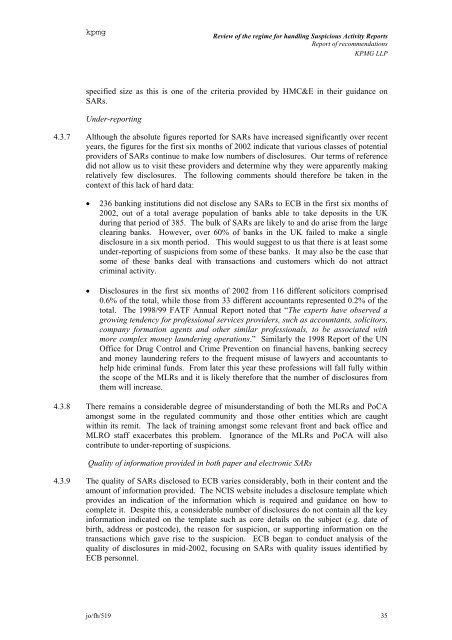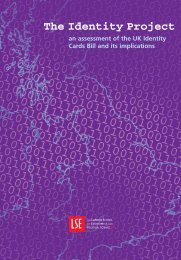Money Laundering: Review of the Reporting ... - Dematerialised ID
Money Laundering: Review of the Reporting ... - Dematerialised ID
Money Laundering: Review of the Reporting ... - Dematerialised ID
You also want an ePaper? Increase the reach of your titles
YUMPU automatically turns print PDFs into web optimized ePapers that Google loves.
kpmg<br />
<strong>Review</strong> <strong>of</strong> <strong>the</strong> regime for handling Suspicious Activity Reports<br />
Report <strong>of</strong> recommendations<br />
KPMG LLP<br />
specified size as this is one <strong>of</strong> <strong>the</strong> criteria provided by HMC&E in <strong>the</strong>ir guidance on<br />
SARs.<br />
Under-reporting<br />
4.3.7 Although <strong>the</strong> absolute figures reported for SARs have increased significantly over recent<br />
years, <strong>the</strong> figures for <strong>the</strong> first six months <strong>of</strong> 2002 indicate that various classes <strong>of</strong> potential<br />
providers <strong>of</strong> SARs continue to make low numbers <strong>of</strong> disclosures. Our terms <strong>of</strong> reference<br />
did not allow us to visit <strong>the</strong>se providers and determine why <strong>the</strong>y were apparently making<br />
relatively few disclosures. The following comments should <strong>the</strong>refore be taken in <strong>the</strong><br />
context <strong>of</strong> this lack <strong>of</strong> hard data:<br />
• 236 banking institutions did not disclose any SARs to ECB in <strong>the</strong> first six months <strong>of</strong><br />
2002, out <strong>of</strong> a total average population <strong>of</strong> banks able to take deposits in <strong>the</strong> UK<br />
during that period <strong>of</strong> 385. The bulk <strong>of</strong> SARs are likely to and do arise from <strong>the</strong> large<br />
clearing banks. However, over 60% <strong>of</strong> banks in <strong>the</strong> UK failed to make a single<br />
disclosure in a six month period. This would suggest to us that <strong>the</strong>re is at least some<br />
under-reporting <strong>of</strong> suspicions from some <strong>of</strong> <strong>the</strong>se banks. It may also be <strong>the</strong> case that<br />
some <strong>of</strong> <strong>the</strong>se banks deal with transactions and customers which do not attract<br />
criminal activity.<br />
• Disclosures in <strong>the</strong> first six months <strong>of</strong> 2002 from 116 different solicitors comprised<br />
0.6% <strong>of</strong> <strong>the</strong> total, while those from 33 different accountants represented 0.2% <strong>of</strong> <strong>the</strong><br />
total. The 1998/99 FATF Annual Report noted that “The experts have observed a<br />
growing tendency for pr<strong>of</strong>essional services providers, such as accountants, solicitors,<br />
company formation agents and o<strong>the</strong>r similar pr<strong>of</strong>essionals, to be associated with<br />
more complex money laundering operations.” Similarly <strong>the</strong> 1998 Report <strong>of</strong> <strong>the</strong> UN<br />
Office for Drug Control and Crime Prevention on financial havens, banking secrecy<br />
and money laundering refers to <strong>the</strong> frequent misuse <strong>of</strong> lawyers and accountants to<br />
help hide criminal funds. From later this year <strong>the</strong>se pr<strong>of</strong>essions will fall fully within<br />
<strong>the</strong> scope <strong>of</strong> <strong>the</strong> MLRs and it is likely <strong>the</strong>refore that <strong>the</strong> number <strong>of</strong> disclosures from<br />
<strong>the</strong>m will increase.<br />
4.3.8 There remains a considerable degree <strong>of</strong> misunderstanding <strong>of</strong> both <strong>the</strong> MLRs and PoCA<br />
amongst some in <strong>the</strong> regulated community and those o<strong>the</strong>r entities which are caught<br />
within its remit. The lack <strong>of</strong> training amongst some relevant front and back <strong>of</strong>fice and<br />
MLRO staff exacerbates this problem. Ignorance <strong>of</strong> <strong>the</strong> MLRs and PoCA will also<br />
contribute to under-reporting <strong>of</strong> suspicions.<br />
Quality <strong>of</strong> information provided in both paper and electronic SARs<br />
4.3.9 The quality <strong>of</strong> SARs disclosed to ECB varies considerably, both in <strong>the</strong>ir content and <strong>the</strong><br />
amount <strong>of</strong> information provided. The NCIS website includes a disclosure template which<br />
provides an indication <strong>of</strong> <strong>the</strong> information which is required and guidance on how to<br />
complete it. Despite this, a considerable number <strong>of</strong> disclosures do not contain all <strong>the</strong> key<br />
information indicated on <strong>the</strong> template such as core details on <strong>the</strong> subject (e.g. date <strong>of</strong><br />
birth, address or postcode), <strong>the</strong> reason for suspicion, or supporting information on <strong>the</strong><br />
transactions which gave rise to <strong>the</strong> suspicion. ECB began to conduct analysis <strong>of</strong> <strong>the</strong><br />
quality <strong>of</strong> disclosures in mid-2002, focusing on SARs with quality issues identified by<br />
ECB personnel.<br />
jo/fh/519 35









